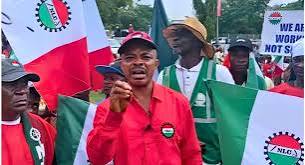The organised labour, comprising the Nigeria Labour Congress (NLC) and the Trade Union Congress (TUC), on Tuesday rejected the Federal Government’s latest offer of a ₦60,000 minimum wage for Nigerian workers.
This marks the fourth proposal from the government in approximately two weeks since negotiation talks resumed.
The negotiations, involving the Tripartite Committee for the negotiation of a new minimum wage, saw the Federal Government and the Organised Private Sector (OPS) side propose a ₦60,000 monthly minimum wage on Tuesday, a slight increase from the ₦57,000 suggested last week.
This is in contrast to the ₦48,000 and ₦54,000 proposed earlier by the government and OPS, which were also turned down by the organised labour.
In response, the organised labour adjusted their demand, moving from their initial ₦615,000 to ₦497,000 last week, and finally to ₦494,000 on Tuesday.
Despite this adjustment, the talks concluded without an agreement, leaving the negotiations deadlocked just three days before the May 31 deadline set by the labour unions for the government to finalize the new minimum wage.
The labour unions argue that the existing minimum wage of ₦30,000 is grossly insufficient to meet the basic needs of Nigerian workers.
They point out that not all state governors are adhering to the current wage, which expired in April 2024, five years after the Minimum Wage Act of 2019 was signed by former President Muhammadu Buhari.
The Act mandates a review every five years to align with the economic realities facing workers.
NLC President Joe Ajaero criticized the government’s fresh proposals as inadequate.
“It is still not substantial compared to what we need to make a family moving,” Ajaero stated, emphasizing the inadequacy of the current ₦30,000 wage in sustaining workers and their families.
Ajaero highlighted the economic disparities between the wealthy and the working class in Nigeria.
“The economy of the workers is totally destroyed. In fact, the workers don’t have any economy.
“ I think there are two economies in the country; the economy of the bourgeoisie and the economy of the workers. I think we have to harmonise this so that we can have a meeting point,” he remarked.
The ongoing deadlock in negotiations underscores the significant gap between the government’s offers and the labour unions’ demands.
With the deadline approaching, the outcome of these negotiations will be critical in determining the future economic well-being of Nigerian workers.
Do you want to share a story with us? Do you want to advertise with us? Do you need publicity for a product, service, or event? Contact us on WhatsApp +2348183319097 Email: platformtimes@gmail.com
We are committed to impactful investigative journalism for human interest and social justice. Your donation will help us tell more stories. Kindly donate any amount HERE




